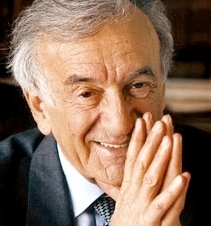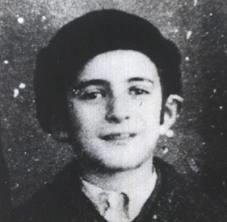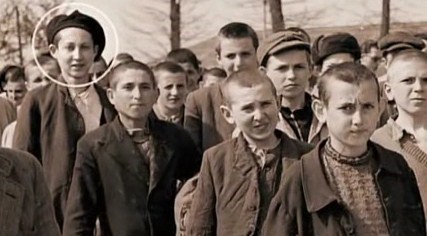 |
| (http://www.fsu.edu/news/2011/10/03/elie.wiesel/ ()) |
In Elie Wiesel's Nobel Peace Prize acceptance speech he stated, "Our lives no longer belong to us alone; they belong to all those who need us desperately" (Wagner 7). Wiesel had been awarded this prize for his outstanding contribution to end violence, repression, and racism throughout the world. It took him ten years to finally speak out for his beliefs because he had finally realized that his life as a survivor of the Holocaust would not mean anything, unless he helped those who had also suffered. Elie Wiesel is an educator, an author, and a humanitarian. He uses his experiences, and lectures to acknowledge all the horror our world has caused by racial, religious, or social discrimination. "Elie Wiesel was born in Sighet, Transylvania, on September 30, 1928" ("Elie Wiesel" Encyclopedia). Growing up, Wiesel was a very religious man (Wagner 9). When he was fifteen, Wiesel and his family were placed in the Jewish ghetto of Sighet and later transported to the concentration camps at Birkenau and Auschwitz. "He remained there until January 1945 when, along with thousands of other Jewish prisoners, he was moved to Buchenwald in a forced death march. Buchenwald was liberated on April 11, 1945, by the United States army" ("Elie Wiesel" Encyclopedia). After his horrific experience in the concentration camp, Wiesel had struggled with his faith (Prescott). In France, Wiesel found the love of his life, Marion Erster Rose, and married her in 1969. He had son with her, Shlomo Elisha Wiesel, who they named after his father ("Elie Wiesel" Elie)."In 1956 he moved to New York to cover the United Nations and became a U.S. citizen in 1963. After the 1960 English language publication of Night, Wiesel wrote more than 40 books". Wiesel had won the Nobel Peace Prize for his tireless efforts in confronting social injustice around the world ("Elie Wiesel" Encyclopedia). In 1988, he established his own foundation, with his wife, to help others who had suffered many of what he has and to voice his beliefs in world problems such as conflicts from hatred and ethnicity ("Elie Wiesel" Elie).Despite his struggle with God and the fear within him from the years in the concentration camps, where he had lost all humanity, he blocked out his thoughts and was fixed on helping others. Elie Wiesel not only survived the Holocaust, but was brave enough to share his living nightmare and determined to spread peace all across the world.
 |
| Elie Wiesel at a young age ((glogster.com)) |
Wiesel's bravery in facing his fears guided others who have also experienced agonizing pain and grief. Many people suffer from countless mistakes and memories, and allow the pain to take over their lives. However, Elie Wiesel is different, he has learned to endure the pain and keep moving forward: "It is a book so grounded in reality that Wiesel waited a decade before starting to write it--out of fear. A student of the Kabbalah, or Jewish mysticism rooted in part in numerology, he knew that words can open the gates of heaven--or hell. 'I know the dangers inherent in words. I wanted to be sure they would not affect other people in a way they shouldn't"'(Schleier). Elie Wiesel endured so much as a child that the pain and memories can never be washed away. Fear has taken much of him, but he is brave and strong. He was able to face his fears 10 years later after Auschwitz, to reopen all the wounds of his tortured life during the Holocaust in order to share it in his written account of the Holocaust. Night included all the depths of his experience and showed how he had lost all hope and everything he ever had. The book shared his experiences, so others may learn and understand how the Holocaust truly was. His bravery has saved many lives and continue to everyday. He is truly a remarkable survivor and hero of the Holocaust and the world. No longer allowing misery to control him, Wiesel has taken his pain and turned it into strength for others. He continues to remember the horror, but keeps moving forward. Lately, he's noticed he dreams more often about the past, but other survivors tell him the same thing: "Nevertheless, you have to continue. You must continue, or you become a prisoner of that pain"(Schleier). Elie Wiesel continues to relive his horrific past through dreams, but is encouraged by others to fight through it and continue the battle or his life will be lost in all the pain, unable to find himself again. With the help of others, Wiesel has found strength in himself to pursue his mission of ending chaos in the world created by religious, racial, or social bigotry. He knew what he needed to do as a survivor of the Holocaust. Wiesel no longer allowed himself to live in fear, and his strength has made a difference in society and history. Wiesel had inspired many people with his own experiences and understanding of the world by his bravery and caring beyond himself.
 |
| (https://furtherglory.wordpress.com/2012/05/10/corr ()) |
The determination Wiesel has, allows many to learn from him and aspire to make a change in the world as well. Elie Wiesel finds many ways to spread the same message of his beliefs for a greater society in the world: "Wiesel is an educator in addition to being an author and a humanitarian. He uses the classroom, his writings, and speaking engagements to work to alleviate the suffering caused by racial, religious, or social bigotry" (Prescott). Elie Wiesel works diligently to inform others of his beliefs against the unfortunate events caused by racial, religious, and social injustice. Elie Wiesel had many questions relating to the idea of humanism. He spent countless hours researching and trying to find answers. Even without any luck he never gave up, he is persistent on finding solutions (Goldman). Elie Wiesel is determined to the problems of many others before his own in order to have a reason for his survival. He wants to help make the world a better place and remind people of how tragic the Holocaust was. Wiesel believes he has a new purpose in the world, being a survivor of one of the most devastating and catastrophic event in our history: "As a survivor of the Holocaust, he says, "I believed that, having survived by chance, I was duty-bound to give meaning to my survival, to justify each moment of my life. I knew the story had to be told. Not to transmit an experience is to betray it." Survivors, concludes Wiesel, "bear witness" by giving voice to the victims: "Why do I write? To wrench those victims from oblivion. To help the dead vanquish death" (Bloom). Elie Wiesel, a survivor of the Holocaust, wants to speak out for his beliefs and allow others to understand the conflicts in the world. He is set on helping others in any way he can, through his books, lectures, and life. For him, it is nothing but pure hope on changing the world for the better. He wants to give people who have suffered the peace of mind, even if he has not found it himself. Wiesel continues to be the voice for many in his incredible journey of finding and creating equality all across the globe. Elie Wiesel has tremendously impacted lives with his determination and dedication to live in a world without hatred.
Elie Wiesel's courage and dedication in pursuing a better world, has changed the life of many who have suffered the same pain caused by social, religious, and racial differences. Wiesel chose many difficult routes throughout his life, but in the end he came out strong and with a spark of determination to voice his beliefs. From the years at Auschwitz until today, Wiesel remembers and feels the same pain, but doesn't let it stop him. He portrays the characteristics many strive to be, strong minded, determined, caring and selfless. Wiesel understands the pain inflicted upon many, allowing him to connect with others. He understands what many go through, and helps them through his lectures and books. All of his accomplishments were made by his deep connection between him and his audience. Elie Wiesel has dedicated his life to help others and their problems. As a human rights activist, he supports and speaks out for the rights of humans all around the world. Elie Wiesel is a man who truly finds helping others to be something extremely great. He spends his life trying to guide others and spread the word of peace. The devotion Wiesel gives to others truly inspires me to make a change in the world. His bravery exemplifies how everyone can stand up for what they believe in, and they will find strength in others along the way. Elie Wiesel's understanding of his purpose to care for others, as a survivor of the Holocaust and as a human being, truly defines him as a great hero.
Work Cited
Bloom, Lynn Z. "Witnessing." MELUS 34.1 (2009): 13+. Biography in Context. Web. 29
Jan. 2015.
"Elie Wiesel." Elie Wiesel. American-Israeli Cooperative Enterprise, 2015. Web. 29 Jan.
2015. <http://www.jewishvirtuallibrary.org/jsou rce/biography/Wiesel.html>.
"Elie Wiesel." Encyclopedia of World Biography. Detroit: Gale, 1998. Biography in
Context. Web. 21 Jan. 2015.
Goldman, L. H., et al. "Elie Wiesel." Critical Survey Of Long Fiction, Fourth Edition
(2010): 1. Biography Reference Center. Web. 30 Jan. 2015.
Prescott, Deborah Lee. "Elie Wiesel." Great Lives From History: Jewish Americans
(2010): 26. Biography Reference Center. Web. 28 Jan. 2015.
Schleier, Curt. "Why Elie Wiesel Can Never Forget." Biography 3.9 (1999): 68.
Biography Reference Center. Web. 28 Jan. 2015.
Wagner, Heather Lehr. Elie Wiesel, Messenger for Peace. New York: Chelsea House,
2007. Print.
Page created on 2/17/2015 12:00:00 AM
Last edited 2/17/2015 12:00:00 AM
